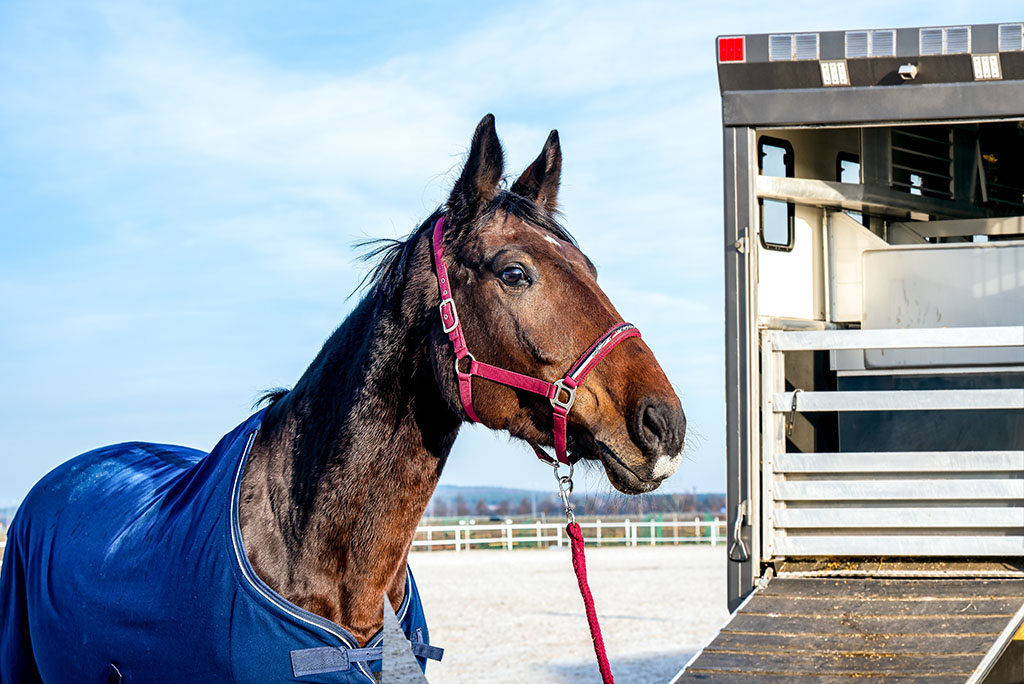On The Pull – How To Find The Best Horse Trailer

If you own a horse you’ll know that there’s often a fair amount of travelling involved, especially if you compete, and having the right transport can make a huge difference. You want your horse to be comfortable and safe on any trip you do, whether that’s to a competition, the vet or even moving house; you want them to be able to get in and out easily and have plenty of light and air.
But where do you start? What do you need to think about when choosing the right trailer for your beloved horse? Here at The Insurance Emporium, we know how important your four-legged friends are to you, which makes them important to us too, so we’ve put together this guide.
What To Look For In A Horse Trailer
When researching horse trailers, the most important thing is that you know your horse, but there are some other things to think about too:
Best foot forward – Every horse is different, and you know what your horse prefers when it comes to whether or not they face forwards or backwards when being transported, but research has indicated that rear-facing horses are more comfortable and secure than those who travel facing forward. There’s also the option to have your horse at an angle (Herring-bone). Whichever one you decide is best, make sure there’s enough room for your horse, but not too much; if your horse has too much room it could fall over when you go around corners etc. You also need to make sure there’s enough headroom.
Licence to chill – As of September 2021, drivers who passed their test after 1st January 1997 no longer have to take a separate trailer test to be able to tow their horses on the road.
Get your coat – To ensure your horse doesn’t sustain any injuries while travelling, or when getting on and off the trailer, it might be a good idea to get them some protective clothing. A well-fitting, leather head collar can protect their head, while tail guards, bandages and leg protectors can prevent rubbing to the tail and legs. A rug can help keep your horse warm during transit, but you also need to make sure they don’t overheat, so the trick is to know your horse and spend time getting them used to any protection they might end up wearing so you know how they’ll react.
Tow the line – Your vehicle will have a maximum towing weight; you’ll find it in the vehicle handbook, or on the VIN (the vehicle identification number) plate. If you’re towing a trailer, then the weight of it (and its contents) can’t exceed the maximum towing limit of your car. For example, if your car’s limit is 2000kg and your trailer is 800kg then you can’t load more than 1200kg in the trailer; this includes your horse, all the equipment, any food and water, as well as fuel. You also need to consider your own driving/towing experience as pulling a ‘live load’ changes how you drive/brake/accelerate and take corners.
Let there be light – Is the interior nice and bright? Trailers can be quite dark and dingy, and your horse is much more likely to travel better if they’re not scared. If it’s not painted white inside you could install interior lights. It’s also good to have the windows and hatches at head height; horses travel easier when they can see outside (although they should never have their heads out of the window while in transit).

Preparation Is Key
You want your horse to feel safe and secure while travelling, especially if you’re taking them to the vet and they may already be feeling distressed, so it’s worth taking the time to prepare them. One bad experience early on can affect how they travel for the rest of their lives, so try not to leave any training until the last minute.
You could use treats as a reward or let them eat a small feed once they’re on the trailer, to make it a positive experience for them, and once you’ve got them used to getting on and off you could try going for short trips; slowly building up to longer ones.
Other Things To Consider
There are a couple of extra things to consider when looking at trailers:
How many horses will you be moving?
Do you usually need to take a lot of extra kit with you?
How easy is it to get on and off? Are the ramps nice and steady? How wide is the entry?
Is there padding inside the trailer for where there might be contact between the horse and the trailer?
What’s the suspension like?

Recommendations
Here are our top 5 recommended trailers:
The Cheval Trailers Touring One is a great single-horse trailer; it’s small but has front and rear ramps and two sliding windows.
The Bateson Deauville has space for two horses, with a divider in the middle, as well as an internal saddle rack.
The Ifor Williams HB510XL can carry two horses, or four ponies, and has plenty of windows and air vents.
The Equi-Trek Apollo is a lightweight trailer that’s engineered to be incredibly strong. Its independent suspension will ensure a comfortable journey every time.
The Fautras JMS is a fibre-glass, one-horse trailer that enables the horse to load at the rear and unload at the front, and as it’s so low to the ground there’s no need for a ramp.
Conclusion
Taking your lovely horse out on the road can feel like a bit of a risk, so you want to do it as safely and comfortably as possible, whether you’re out and about regularly, or you just venture out every so often.
We all know that Horse Insurance is important, but you might also want to think about Horse Trailer Insurance. Our policies come with one Standard Benefit that you can add to with a range of additional Optional Benefits that leave you with a policy that can suit your needs. Why not take a look today or talk to one of our friendly team!
^Horse Trailer Insurance covers trailers or other horse drawn vehicles. This is subject to some exclusions.
All content provided on this blog is for informational purposes only. We make no representations as to the accuracy or completeness of any information on this site or found by following any link on this site. We will not be liable for any errors or omissions in this information nor for the availability of this information. We will not be liable for any loss, injury or damage arising from the display or use of this information. This policy is subject to change at any time.
We offer a variety of cover levels, so please check the policy cover suits your needs before purchasing. For your protection, please ensure you read the Insurance Product Information Document (IPID) and policy wording, for information on policy exclusions and limitations.






